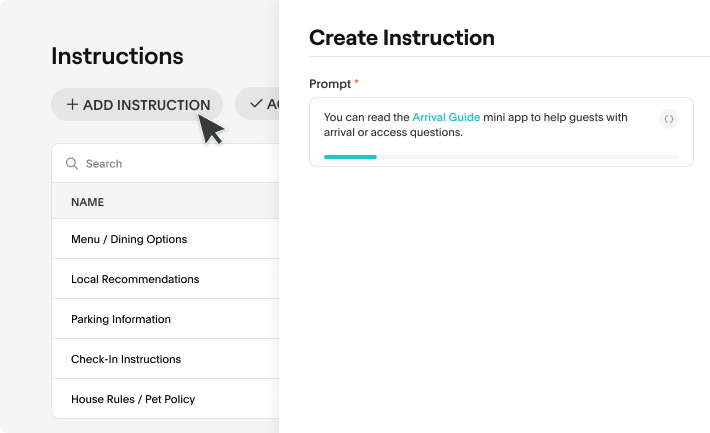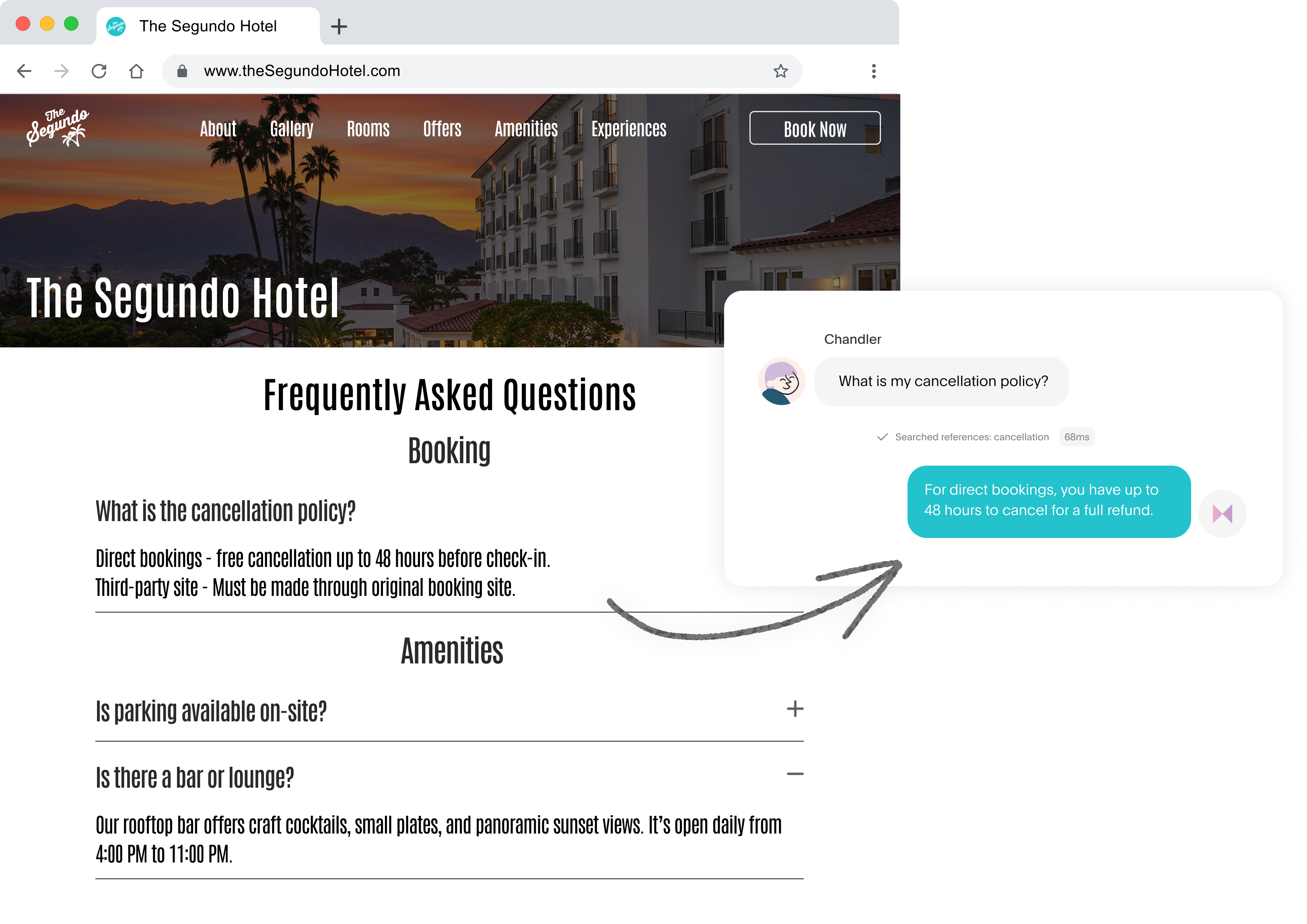Top 20 Secrets to Success in Hotel Marketing
If you don’t have a plan for marketing your hotel yet, you’re probably not getting the results you want. The hotel industry is very competitive, but your hotel can stand out to travelers by creating a comprehensive marketing plan. Whether you run a small bed and breakfast, a mid-sized independent hotel, or a larger hotel chain, you can drive more hotel bookings and increase revenue by using some or all of these hotel marketing strategies.
Put your best foot forward with a great website
Your website is your most important marketing asset and the foundation of any successful online marketing strategy. Your website is the main place where people can learn about your hotel and make their decision about whether to book with you. Websites also offer the capability of direct bookings, so it’s especially important that you invest your time into making your website as user-friendly and attractive as possible.
To make your website user-friendly, don’t go overboard with flashy fonts or animations and overwhelm your prospective customers. Keep it easy and intuitive to navigate and interact with, so people can focus on the most important messages that you’re trying to convey.
Since people are naturally drawn to great visuals, ensure that your website content is also visually appealing. Use high-quality photos of your property to get people interested in booking with you.
Highlight safety measures during COVID-19
The most important aspect of running a hotel during the pandemic is ensuring that guests and staff are safe during their stay. Aside from maintaining all the proper safety measures, hotels need to clearly communicate their new policies to prospective guests and reassure guests that they will be safe at the property.
Highlight all the steps you are taking to maintain cleanliness and social distancing on your website, social media posts, during the booking process, and on any third-party websites. Communicate any additional measures you’re taking, such as contactless check-in or reduced housekeeping during the stay.
Include social proofs on your website
According to a study by BrightLocal, 76 percent of consumers trust online recommendations as much as personal recommendations. While this percentage sounds like a lot, you can actually use this data to your advantage.
Include positive reviews from past guests directly on your website to convince prospective customers to book with your hotel. To get more direct bookings, include social proofs during the booking process itself. Use pictures of happy guests, positive reviews that feature your safety measures during COVID-19, your excellent service, and any distinguishing qualities about your property.

Chatbots
Chatbots can be used to drive direct bookings on hotel websites. Chatbots are rule-based or powered by artificial intelligence, and they can quickly answer any questions that website visitors have. Since chatbots can answer queries 24/7, they can encourage prospective customers to book directly on the website no matter what time they are browsing.
Reply to negative online reviews
Unfortunately, not every guest will be completely satisfied with your service, and there can be negative online reviews for your property. Although it is ideal to prevent negative reviews using service recovery processes, you can still reclaim a negative review by responding to it. In fact, 87 percent of prospective guests have a better impression of hotels if they respond appropriately to negative reviews.
By thanking guests for feedback and committing to resolving the issue, you can send a message to prospective customers that you value every guest and that you’re dedicated to providing exceptional service. If you can effectively solve the issue privately with a negative reviewer, you could request that they edit their review or take it down once they’re satisfied with your service.
Optimize booking for mobile
Smartphones have advanced to have many of the capabilities that desktops have, and people increasingly use smartphones to complete tasks they would normally do on desktops. Making bookings for hotels is one of them. The growing popularity of mobile means that hoteliers need to design and optimize their website and booking processes for mobile devices.
An easy-to-navigate website on mobile can capture more direct bookings, and a seamless booking experience can improve guest satisfaction. Also, people typically make last-minute bookings on mobile devices, so your mobile website needs to be able to effectively capture those reservations.
Virtual tours
A virtual reality video tour of your hotel can be a great way to let your prospective guests see exactly how they would experience your property from their point of view. Using a 360-degree presentation of your property allows browsing visitors to get a better feel for the space, and it can move them further down the decision funnel.

Improve the guest experience
No matter which marketing strategies you use, the ultimate key to success in hotel marketing is having a foundation of exceptional service. Without a focus on excellent guest experiences, other hotel marketing strategies can only take you so far.
To improve the guest experience, communication is key. Give your guests an easy avenue to provide honest feedback, such as through guest surveys, and enable quick service recovery while guests are still on the property. Surveys can also be used to collect feedback from guests post-stay, and they can be used to continually improve operations to create unforgettable experiences for your guests.
Email marketing
Email marketing has been known to be a very effective tool in many industries, and you can use it at your hotel to upsell guests and re-engage past guests. By sending out an email asking about preferences prior to arrival, you can effectively upsell upgrades and add-ons that can personalize your guests’ experiences. After guests check-out, you can also send post-stay emails to communicate other offers, promotions, and loyalty programs.
SMS marketing
Text-message marketing is another tool that can be used to re-engage past guests with special offers. As a marketing tool, text-messaging has a 98 percent open rate and a 45 percent response rate.
While emails can easily go unopened in inboxes due to the widespread use of email marketing, SMS marketing can be a way to get attention. Drive more direct conversions by welcoming guests back directly through text messaging with personalized offers.
Personalized messaging
In any context, it can never hurt to remember special dates, such as birthdays or anniversaries. Keep track of special occasions to personalize your messaging to past guests and invite them back to your hotel to celebrate those dates.
Another approach is to create audiences by interests and behaviors and target those audiences with deals that relate to them personally. For instance, you could create an audience of “wine-lovers” and welcome wine-loving guests back to your hotel for a special wine tasting night. These targeted messages can help you convert more past guests into loyal customers.

Social media marketing
Oftentimes, prospective guests look at social media accounts as a part of their research process before making reservations.
After browsing through your website, they may look at your social media accounts to assess your popularity and whether your property is actively in operation. They want to see high-quality and frequent content on social media platforms such as Facebook, Instagram, Twitter, and Youtube.
In order to take advantage of social media marketing, use these platforms to showcase your beautiful property, the unique qualities and offerings, and stories of remarkable guest experiences.
SEO
Search engine optimization (SEO) is critical to driving more organic traffic. Most people go to search engines first when researching hotels to book with, and since most people don’t look past the first page of search engine results, it’s essential that your website ranks as high on the first results page as possible.
By regularly managing your SEO and improving your rankings, you can get more bookings for less spend.
Digital advertising
It’s no question that there’s a lot of competition in the hotel industry. Even when you optimize your website, it can still be hard to get placed in the first position of search results when people make generic searches like “Hotels in Los Angeles”. To stand out, you can use digital advertising to rank higher on search engines and grab attention.
With digital marketing overall, just remember to watch your budget carefully and continuously reassess what’s working or not, since ads can get expensive.
Create landing pages to convert visitors into guests
Landing pages are great ways to convert visitors into customers. The essentials of a landing page that converts well are clear and relevant messaging, removing other links, and a strong call-to-action (CTA).
Keep the messaging on landing pages clear and concise, but most importantly, keep it in line with the messaging from the advertisements that brought people to your landing page. If the messaging doesn’t match with website visitors’ expectations, then they will quickly leave your page. Make sure all of your landing page content matches clearly with your advertisement copy.
As a landing page, your primary goal should be to get the website visitors to convert on that page directly. That also means that you should keep people from navigating away from that page. Limit the number of links that people can click on, and you can even take out the navigation bar to keep the page focused on the conversion action.
Finally, people may not take any action on your landing page unless you give them the directive to do so. This is where the CTA button comes in handy. Having a clear CTA tells the viewer to actually do something on your page; otherwise, the page could just look like informative content with an ambiguous purpose.

Retargeting
Most of the time, people don’t make a booking immediately when they’re first researching a hotel to stay at. Travelers may look at a couple different options before making a decision, and they’ll take some time to consider which one to go with at a later time.
Your hotel can use retargeting to remind prospective guests of your offerings after they leave your website. You can create retargeting ads through Google Ads and Facebook, so users who once visited your website will see targeted ads to invite them back to your website to make that final booking.
Spend more during peak seasons
As a hotelier, you know which season gets the most bookings in a year. To optimize your marketing plan, allocate more advertising spend to the peak seasons when people are traveling to your location. For instance, if you are located near a ski range, your property likely gets the most traffic during winter, so you should focus on advertising more during that season.
Customer loyalty program
It’s less difficult to convince a past guest that you can offer them a great guest experience than it is to convince someone who hasn’t stayed with you before.
Reward returning guests with a customer loyalty program that gives special discounts and deals to guests who have stayed with you multiple times, and encourage newer guests to continue coming back for more great experiences.

Partnerships with local businesses
During a guest’s trip, they’re usually not only making a stop at your hotel. They will likely also visit other local businesses. By partnering with local restaurants, bars, stores, and nearby attractions, your hotel can get recommendations from these places.
Partnerships enable both parties to get more exposure and build stronger reputations in their locations, and these relationships can continue to evolve over time to mutually benefit each party.
Metasearch Sites
Metasearch websites can collect information from many hotels in the same area and compare them all on one platform. Examples of metasearch websites include TripAdvisor and Trivago, which are widely used to research hotels before booking.
These websites drive more website traffic for hotels than any other platforms, with advertising on them driving upwards of a 180 percent increase in bookings. Many travelers use metasearch websites to research and easily compare different hotels in the same location, so hoteliers should take advantage of advertising on these websites to drive more direct bookings.
Time is one the greatest asset and one of the things that [Akia] has helped us out as a property tremendously.
Wanny M.
Marketing Associate
Time is one the greatest asset and one of the things that [Akia] has helped us out as a property tremendously.
Ethan Fishbane
Director of The Front Office, Prince Waikiki
Schedule of events and useful links
Never miss a beat with our comprehensive schedule of events and collection of useful links.

Schedule of events and useful links
Never miss a beat with our comprehensive schedule of events and collection of useful links.

See Akia in action!
Schedule a demo today and learn how our hospitality platform can transform your operations and elevate your guest experience.














